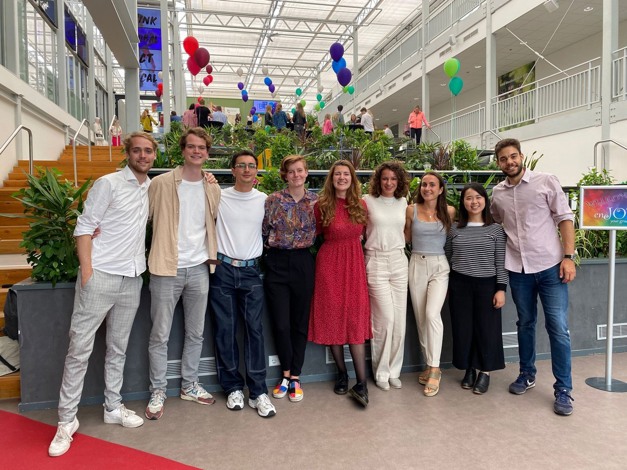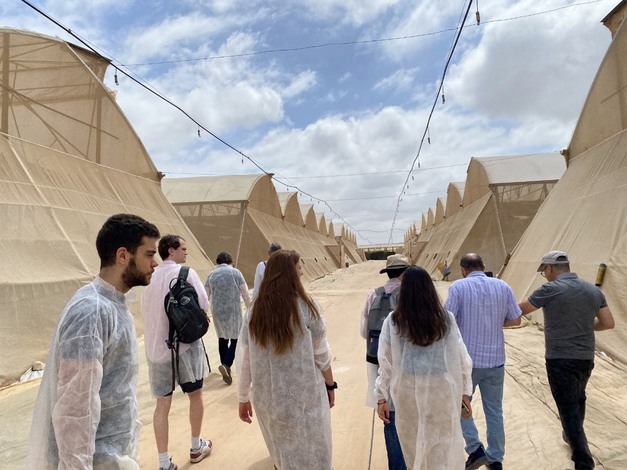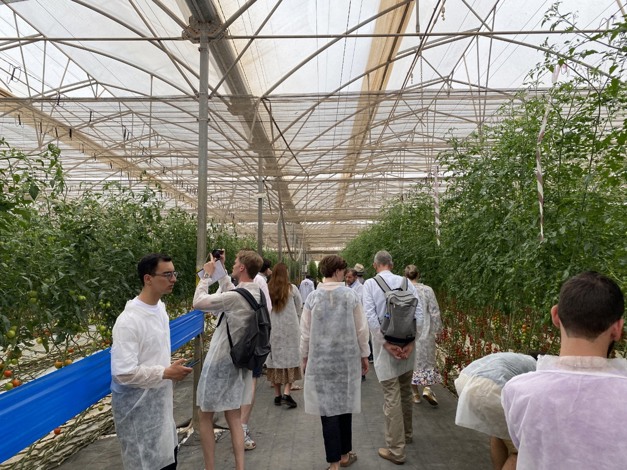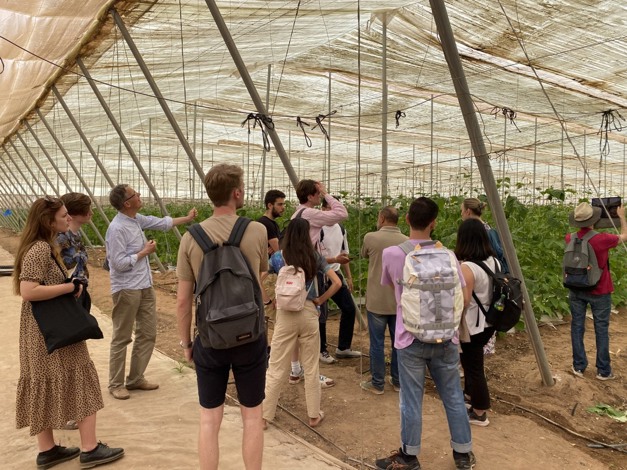Anne Schmitz has written a graduation thesis for the master's degree in Management of Innovation at Erasmus University in collaboration with HortiTech. The research focused on knowledge transfer from Dutch horticultural companies to Morocco with the aim of modernizing Moroccan horticulture and expanding the Dutch market. She specifically researched the influence of Dutch and Moroccan culture on the innovation of the Moroccan horticulture sector in the Sous-Massa region. There is a feeling in the business community in the Dutch horticulture sector about this, but it is often underestimated. Above all, the study comes up with a number of recommendations for Dutch companies looking to work in Morocco. The data was gathered during a 9-day trip to Morocco and interviews with Dutch horticulture companies.

Anne gives her final presentation to the stakeholders
The research shows that there are big differences in where decisions are made in business in the Netherlands and Morocco. The research on knowledge transfer from Dutch horticultural companies to Morocco shows that in Morocco, there is mainly a top-down structure. Dutch companies mainly have contact with people at the bottom of the organization in Morocco. These are often not the people who are allowed to make decisions about innovations in Morocco. The graduate notices that in Morocco, innovation decisions are mainly made by people who function high up in the hierarchy and do not always know the problems in practice. But they often choose technology that local Moroccan growers feel is not really problem-solving. Local Moroccan growers actually want more innovations in water because that is a big problem in Morocco.

Students at the World Horti Center.
Masculine culture
Morocco is building knowledge expertise, according to the graduate student. Together with universities, Morocco wants to research new technologies that are precisely applicable in the Moroccan climate. Demonstrating new technology is very important in Morocco. This is because there is a masculine culture there, so competition between growers is high. Growers will, therefore, have to be convinced of new technology through a good demonstration before they start using it. This can also be seen in the field of knowledge exchange. "In the Netherlands, we are relatively open in this, but in Morocco, on the contrary, people are closed when it comes to knowledge exchange."
Growers in Morocco are short-term focused. They focus on the problems of today and tomorrow and not those of 5 or 10 years. The graduate explains, "They are almost not concerned with those problems. Certain important investments are therefore not made. It helps enormously if insight is given into the payback period of investments. What are the costs for growers, and what do they ultimately yield? Understanding the cost picture is important for Moroccan growers to invest in technology." Currently, with gas prices rising, Dutch growers are looking at growing in Morocco. This would provide them with more income in winter.

Greenhouses in Morocco
Study tour
Her thesis was part of a multidisciplinary thesis program. She, therefore, went to Agadir in Morocco with a group of 10 students. There, they visited Hassan II University, which offers both undergraduate and graduate studies in Agro-technology. She says: "We visited growers to see what a greenhouse in Morocco looks like. You see great technological diversity in how the greenhouses are developed. In one greenhouse, they are still growing in the open, while in another, they are already growing on substrate. Those mats are placed on the ground, so you still have a lot of water loss. There are also differences in nets to keep pests out. We discovered these differences by visiting different growers."
She also had many stakeholder meetings during the study tour, including with the Ministry of Agriculture and Land for the Souss-Massa region around Agadir. "There we sat at the table with various officials within the ministry. But also, for example, with the Water-Basin Agency. That organization deals with distributing drinking water. We also visited an incubator for technological innovations. We joined a meeting of farm managers within horticultural companies."

Visiting a greenhouse in Morocco
"In Morocco, they also have cooperatives, but they have a different structure than in the Netherlands. A cooperative in Morocco means that there is one owner of that cooperative, and that cooperative has several branches. In the Netherlands, the cooperative is a kind of association of several horticultural companies, where everyone is an owner. In Morocco, there is one management or board and this may include as many as 50 branches. For every five to eight branches, there is then a manager at the sites."
Patience, respect, and mastering the local language
"Currently, you see more and more of a network approach emerging. A number of Dutch horticultural parties have joined forces to establish themselves more in Morocco together. They want to share more knowledge about the approach in Morocco this way. Ultimately, it is important that we, as Dutch companies, start learning from each other how best to start trading in Morocco."
The sensitive point is that Dutch companies sometimes send people to Morocco who have not read up enough on Morocco's culture. However, Moroccan growers will have to be addressed in a different way than a Dutch grower. According to Anne, there is a lot to be gained there in how best to approach such a trading relationship. She says: "You shouldn't underestimate that. The assumption that Dutch Moroccans are the same as Moroccans living in Morocco, or that growers everywhere think and act the same, are assumptions you can quickly fall into a trap with."
Dutch companies, therefore, often send their employees of Moroccan background to Morocco because of the affinity with both cultures. This sometimes allows them to build a trading relationship faster. However, they are often seen as Dutch in Morocco. "Patience, respect, and mastery of the local language or a contact with good command of the English language are the basis for a fruitful relationship."
Jo van Nunen Thesis Award
Every year, Rotterdam University presents the Jo van Nunen Thesis Award. There is an independent committee that analyses all master theses throughout the year. It is an award for doctoral research that manages to bridge theory and practice. Anne Schmitz's thesis is also nominated for this award, and the winner will be announced the first week of October.

The group of students visiting a Moroccan greenhouse
Dutch vegetable growers
The recent graduate says: "What you see now is that in the Netherlands, we think it is normal to share knowledge, while in Morocco, it is not common. In the Netherlands, the basic principle is always: if you learn something from me, I will learn something from you (in other words, everyone benefits from exchange). In Morocco, growers really see each other as competitors. Sharing knowledge to make the competitor better is currently unthinkable in Morocco."
Anne stresses that Dutch parties should be well aware that it can create friction as soon as they start sharing knowledge with Moroccan growers. Those growers are not used to sharing knowledge among themselves. "It is very important to be aware of the following: if I engage with one, what does that mean for my ties with other organizations? Discuss the boundaries of a collaboration well. It comes down to showing respect every time, understanding the culture, reading up on it and daring to ask. Don't make assumptions. Surround yourself with knowledge about the Moroccan horticultural sector so that you can go out with a well-filled rucksack."
Finally, she says: "In Morocco, they are really eager for knowledge from the Netherlands. Go and explore those trade relations, but prepare yourself well for Moroccan culture."
Anne's research report can be viewed here.
